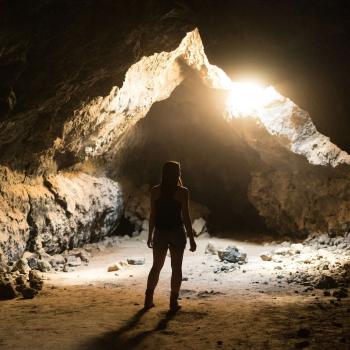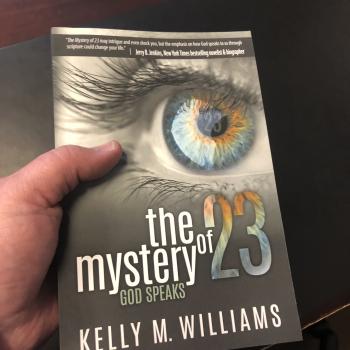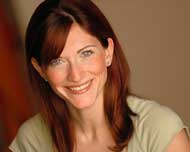G-d praised Abram for his behavior but Abram was upset. How can I be doing so well if you won't give me a child! Here he mentions his steward, why? Because that is who will inherit his household, not a son, since he had no issue. However, G-d assures him, a child of his own will succeed him. Here is our reference to the stars, just as you count the stars, so shall be your descendants.
Abram has a question, how will I know what I am supposed to inherit? So G-d tells him, go get three heifers, goats, rams, and one turtledove, and young bird. The large animals they physically divide in half and put one half of the carcass on one side of the path and the other on the other side. This was their way of signing a contract. G-d and Abram made a covenant. It was thus a custom to seal a covenant by dividing an animal in half.
But G-d warns Abram, this isn't going to be easy; your family will be strangers in a land that isn't theirs and will be enslaved for 400 years. G-d does tell Abram that he will be spared this and that he will die and be buried before this. It won't be until the fourth generation after Abram that they come back to this land. What does this mean, fourth generation? There were three generations in Egypt and the fourth died in the desert before they entered Israel. What was the land of Israel? As G-d promised it, it would be from the river of Egypt to the Euphrates river . . . a lot more land than makes up current Israel.
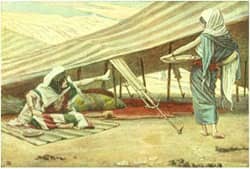 Chapter 16 brings up the child-bearing issue. Sarai has not yet born Abram a child so she tells Abram to build his legacy with her maid, Hagar. Hagar was Egyptian and she conceived quite quickly. Sadly, as soon as she conceived, she started acting as if Sarai was not still the mistress of the house. Sarai punished her and Hagar ran away. G-d inquired as to what she was doing and she replied that she was Sarai's servant and she was running away. G-d told her to go back and take it (personally, I think because she had brought it on herself). But why? She doesn't have to listen to this crazy G-d; she has plenty of her own in Egypt. Well, G-d tells her that she will have a son, Ishmael, and he will be wild but will have many children. So she went home and had her son Ishmael. Abram was 86 when he was born.
Chapter 16 brings up the child-bearing issue. Sarai has not yet born Abram a child so she tells Abram to build his legacy with her maid, Hagar. Hagar was Egyptian and she conceived quite quickly. Sadly, as soon as she conceived, she started acting as if Sarai was not still the mistress of the house. Sarai punished her and Hagar ran away. G-d inquired as to what she was doing and she replied that she was Sarai's servant and she was running away. G-d told her to go back and take it (personally, I think because she had brought it on herself). But why? She doesn't have to listen to this crazy G-d; she has plenty of her own in Egypt. Well, G-d tells her that she will have a son, Ishmael, and he will be wild but will have many children. So she went home and had her son Ishmael. Abram was 86 when he was born.
When Abram was 99, G-d and Abram had a chat. G-d ‘suggested' a covenant with Abram, one that would require circumcision as the signature. With this covenant, Abram will be the father of nations. It is only at this point where his name is changed to Abraham (or Avraham). You have to keep this covenant and every male should be circumcised. This was to happen eight days after the birth; any Jewish male who isn't circumcised has broken the covenant, which could lead to dying prematurely or going childless. Here, Sarai becomes Sarah, which means "my princess" and she is going to become the mother of nations. Why the name change? Because before, Avram and Sarai were private people and now they are the mother and father of nations. Avraham and Sarah are their ‘public personas.'
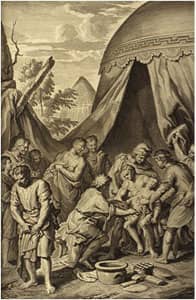 At this, Abraham laughed. He's 100 years old and Sarah is 90. How are they going to parent the nations? G-d promises them that they will, in fact, have another child and his name will be Isaac but Ishmael also will be a great nation. So G-d leaves them with this to think about and immediately Abraham gets Ishmael, who is 13, and they both are circumcised (Abraham was 99). And thus begins our covenant with G-d.
At this, Abraham laughed. He's 100 years old and Sarah is 90. How are they going to parent the nations? G-d promises them that they will, in fact, have another child and his name will be Isaac but Ishmael also will be a great nation. So G-d leaves them with this to think about and immediately Abraham gets Ishmael, who is 13, and they both are circumcised (Abraham was 99). And thus begins our covenant with G-d.
Parshat Lech Lecha from G-dcast.com
More Torah cartoons at www.g-dcast.com
